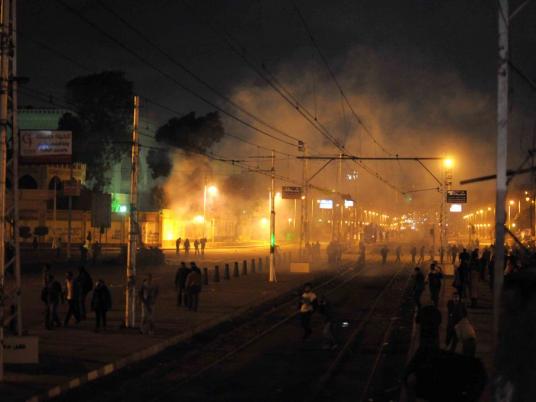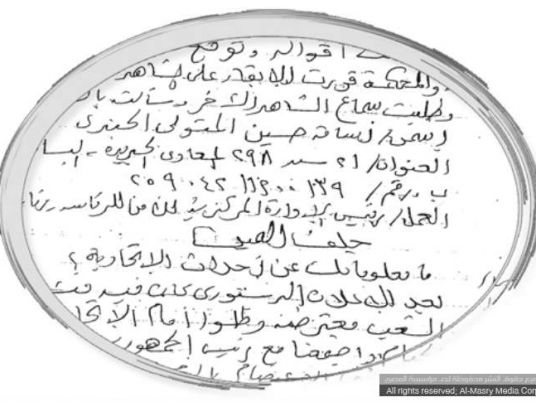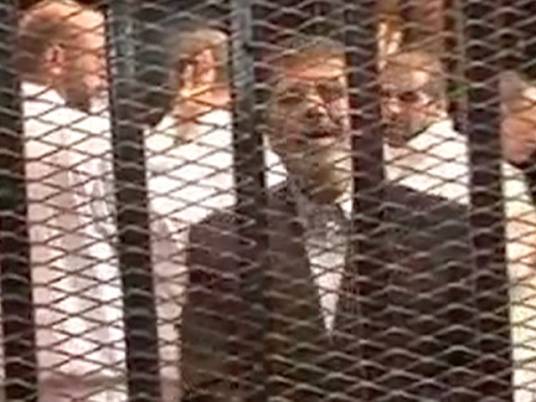
Last Friday’s protests and subsequent clashes in front of the Ettehadiya Presidential Palace, underscored by the security forces’ assault of protester Hamada Saber, saw opposition groups — notably, the April 6 Youth Movement — initially withdraw political support from the protest.
Protesters, however, remained at the palace. Anti-police and anti-government sentiments were high, as protesters stood without the political blessings of the opposition in the face of a heavily armed Central Security Forces.
Hours later, with the video of Saber’s assault going viral, Egypt’s political opposition was again throwing its support behind the protesters.
Last week's events appear to be indicative of a gap between the political street and the political sphere. This Friday's events follow the same pattern and reflect a similar rift.
Founded in the aftermath of President Mohamed Morsy’s November constitutional declaration, which granted his decisions immunity from judicial review and paved the way for the rushed constitutional referendum, the National Salvation Front (NSF), which institutionalized opposition to the government, has since come to be known simply as “the opposition.”
The notion that they control the protesters, however, cannot be taken for granted.
The front and the street
“No one controls the streets,” Ahmed Fawzy, secretary general of the Social Democratic Party, says.
“The NSF leads part of the street, but no one has full control. To some extent, we follow it, and that’s not a bad thing,” Alfred Raouf of the Constitution Party says.
Indeed, many of the NSF’s statements have been framed in terms of following rather than leading. After clashes at the presidential palace last week, which came on the heels of several days of violence across the country, the front’s statement read that it would “fully align to the demands of the Egyptian people.”
“The challenge,” for Shahir George of the Free Egyptians Party, “is not to lead the street, but we have a responsibility to support the street and to make sure that we are not at a distance and do not act in discordance with them.”
Part of the issue for the front, Akram Ismail of the Popular Socialist Alliance Party suggests, lies in the fact that, at the moment, the front “only has the streets.”
The NSF may not direct the protests, may not entirely agree with them, and have many members horrified by the violence, but the front depends on this public mobilization, Ismail argues.
“The more radical the street is, the more radical the front is. It cannot be conservative — even if some of its members want that — simply because the street isn’t conservative,” Ismail argues.
Since the front realized that it cannot direct the street, Amr Abdulrahman of the Popular Socialist Alliance says, “It tries to echo the street.”
Ismail gives as an example of this echoing the more strident language voiced in the past few days by leading NSF figures Hamdeen Sabbahi and Mohamed ElBaradei on security reform and the description of Egypt’s current rulers as killers.
“This is a direct result,” he says, “of the violence — and the blood — on the streets,” Ismail says.
But there is also more than one street.
“The question is which street,” George says. “There is the street in terms of the revolutionary forces, the people actually on the streets, and then there is the street of those sitting at home, who feel there has been no change since the revolution.
“The revolutionary street will never be satisfied. And the other street wants something viable. We have to choose which street we want to lead,” he says.
A double role?
For many, the NSF is trying to do two things — to practice revolutionary and traditional politics at the same time.
This double role is becoming increasingly untenable.
“It’s a very hard balance, between the street getting more radical and the political sphere more narrow,” Ismail argues.
“And by trying to juggle both,” he says, “it ends up unable to do either.”
Part of this juggling act is simply the inevitable outcome of a coalition of what Abdulrahman describes as “strange bedfellows.”
“It’s very hard, given the differences, to make compromises, to reach decisions, to take the same tone,” says Ismail.
Others do not see the differences between the parties as having a significant impact on decision making.
“It is completely natural,” Fawzy says, “for a coalition of different groups and positions to take time to discuss and come to agreement on what positions to take.”
If the crisis continues, “ending either in total domination by the Brotherhood, or a military coup, this would spell the end of politics in Egypt for some time,” Fawzy says.
It is the political sphere and the political game that is under threat. And it is in preserving a sphere for politics — for contestation, whether we call this democracy or not — that the NSF comes in.
If the members of the front are more united by what they are against than what they are for, this raises questions about the extent to which they are viable as a coalition. Raouf, however, dismisses the idea that members of the front are more united by what they are against as “mere propaganda from the Brotherhood.”
“We are against dictatorship and theocracy, which is just another way of saying that we are for a secular democratic liberal state,” he says. “So it isn’t really a big deal.”
As Fawzy sees it, “The differences we have do not get in the way of seeing the danger that the country is in. And when there is actually a political arena to practice politics in, the conflicts and differences manifest themselves. This arena is what we are currently trying to build.”
If the front wants to become an electoral alliance — there is talk of a unified list, or two lists — it will seek to retain unity as far as possible. As such, Abdulrahman argues, its room to maneuver between a largely conservative constituency and a revolutionary language is limited.
The bind is that if the front goes too far in supporting the street, it puts its own unity at risk, and at the moment this unity is seen within the front as a priority.
The NSF’s inability to represent the streets is not simply a reflection of the nature of the front, but of a wider political reality.
“All forces are lagging behind the streets, and this has been the constitutive character of the revolution from the start,” Abdulrahman says.
If police brutality and social injustice were two of the main factors behind the revolution — and are in part what continue to move the street — the front so far has had little to say.
“The alienation from politics that expresses itself on the streets and the anger at the absence of transitional justice simply cannot be fixed by any sort of constitutional amendment,” Abdulrahman stresses.
A generational gap
But it is not just differences between parties that pull the front between revolutionary and more institutional ways of practicing politics, but differences within the parties as well.
“The youth of almost all the parties are against the front. They find it too conservative and reject its political calculations,” says Ismail.
This, for Ismail, has less to do with political inexperience or the supposed hastiness of youth, and more with the fact that their “political education is different.”
A generation that has come of age at a historical moment is not likely to look backward to the tools that opposition groups used prior to that moment.
There have been recent moves, George explains, to bring the youth of the front together across parties, to be in coordination with other groups and make young voices heard.
George says, “The young members of the parties are more a part of the revolutionary movement and take bold steps that are more in line with the streets.”
This would suggest that the tension in the front between what might be described as pragmatic and radical politics is not simply to do with ideology, but something else.
With a new political generation pulling away from an older, more narrow conception of politics, can Egypt now expect the rise of a new, more viable political opposition?
This piece was originally published in Egypt Independent's weekly print edition.




